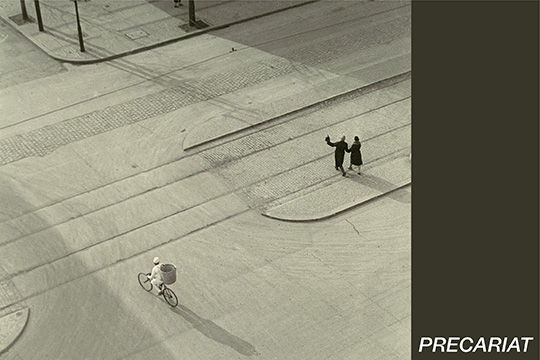Studio C/11
Precariat
Kelum Palipane & Mitchell Walker

Studio Description:
The ‘precariat’ is a neologism coined by economist Guy Standing to describe a new social class in the making, defined by its unstable job conditions, isolation, and tenuous connection to place. Many who occupy the ‘precariat’ are new migrants and young people forced to eke out an existence negotiating these multiple insecurities.
How can we make a difference through architecture? In this studio we will design a hub for food delivery riders in the Melbourne CBD – some of the most mobile, and elusive of actors in our city. The hub will anchor, make visible, and provide a sense of place for the riders – an antidote to precarity. But the notion of anchoring and gaining purchase on a land also has multiple and charged implications in a settler-colonial context where sovereignty has never been ceded by its First Nations People. How might we negotiate this architecturally while interrogating issues of precarity and belonging?
Studio Outcomes:
Students will be introduced to creative ethnographic methods underpinned by Henri Lefebvre’s concept of rhythmnanalysis through which they will document and critically reflect on the interrelationship between time, people, and place. This includes noting the sensory registers of the city, observations across time that capture its multiple temporalities, and interpretation through drawing and models.
Brief: Hub: showers/bathrooms, lockers, bike storage and charging stations, kitchenette, and enriching commons to connect with and form solidarity with others in the city. In addition to this basic brief, students are expected to include programmatic additions/variations as appropriate to their unique conceptual approach to the project.
Site: We will identify a transect or city block in the Melbourne CBD within which students will locate their design intervention after exploring tactical opportunities the cityscape offers through its infrastructure, multiple publics, commerce, and hidden histories.
Studio Leaders:
Kelum Palipane is Senior Lecturer in Architectural Design at the Faculty of Architecture Building and Planning (ABP), University of Melbourne. Through her research and teaching, she investigates how creative ethnographic methods can inform design in demographically complex urban conditions. Her teaching at the ABP spans 14 years including coordinating Design Studio Alpha in the Bachelor of Design since 2017 and Studio C (Sem, 2) in the Master of Architecture since 2023.
Mitchell Walker is a design lead at Wardle working in the public, residential, commercial and healthcare sectors. Mitchell has experience working in intense urban environments with varied cultural conditions with projects in Melbourne, China and the United Kingdom. He is keenly interested in the complex, diverse and layered character of our urban environments and the nature of public space within it.
Readings & References:
- The Precariat by Guy Standing (2014).
- New tech, old exploitation: Gig economy, algorithmic control and migrant labour. Sociology Compass by Lata, L. N., Burdon, J., & Reddel, T. (2023).
- Introduction to Ethnographic Research: A Guide for Anthropology by Kimberly Kirner and Jan Mills (2019).
- Improvising Rhythms: Re-reading Urban Time and Space through Everyday Practices of Cycling by Justin Spinney in Geographies of Rhythm (2010).
- The Aesthetics of Place-temporality in Everyday Urban Space: The Case Study of Fitzroy Square by Filipa Matos Wunderlich in Geographies of Rhythm (2010).
- Envisioning Information by Edward R. Tufte (1990).
- Common space creation: can architecture help? (Towards a provisional manifesto) by Stavros Stavrides, The Journal of Architecture (2023).
- City of Melbourne: Aboriginal Melbourne - https://www.melbourne.vic.gov.au/about-melbourne/melbourne-profile/aboriginal-culture/Pages/aboriginal-culture.aspx
- Adrift in Melbourne by Robyn Annear (2021).
A comprehensive reading list for further project-specific research will be provided in the first studio session.
Schedule:
Monday 6:15-9:15pm & Thursday 9am-12pm in MSD 138
ABPL90437 Design Studio C is an Early start subject. The ballot is held online at the beginning of O-week, opening on Monday 19 February and closing the morning of Tuesday 20 February. There is some preparatory online work to be completed during the week. Teaching begins with an all day, in person, compulsory Symposium on Friday 23 February.
Off-Site Activities:
Visit to the pop-up 'Gig Workers Hub' at 227 Bourke Street, Melbourne.